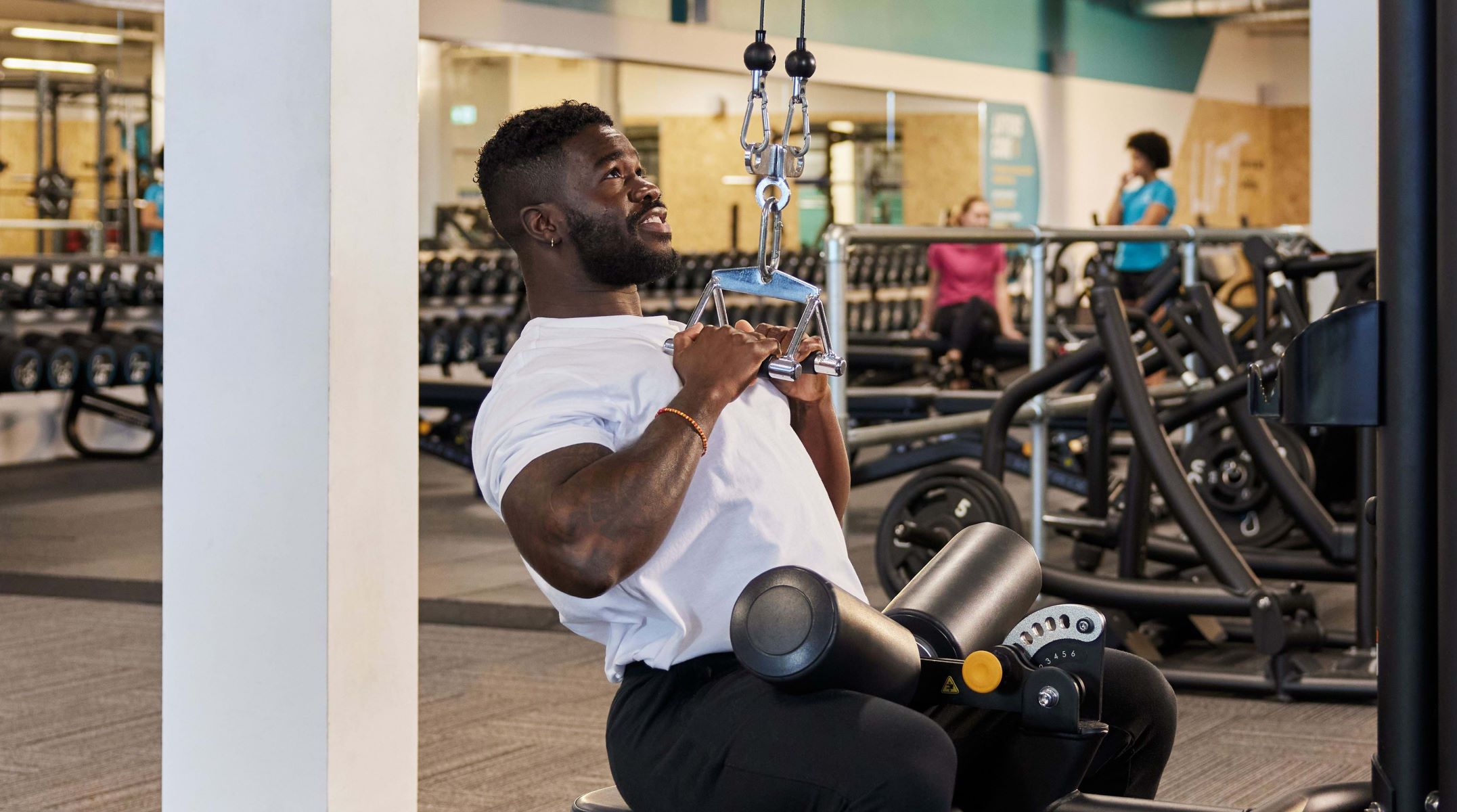Home>Misc>Featured>How To Get Motivated For Weight Loss And Exercise


Featured
How To Get Motivated For Weight Loss And Exercise
Published: September 29, 2023
Discover the best tips and tricks to stay motivated for weight loss and exercise. Get featured and achieve your fitness goals with our expert guidance.
Introduction
Getting motivated for weight loss and exercise is often easier said than done. Many people struggle to find the drive and dedication to stick to a healthy lifestyle, leading to frustration and lack of progress. However, with the right mindset and strategies, you can overcome these obstacles and find the motivation to achieve your weight loss and fitness goals.
Motivation plays a crucial role in the success of any weight loss or exercise journey. It is the fuel that keeps you going when the initial excitement wears off, and the challenges become more apparent. Without motivation, it is easy to give in to temptation, make excuses, and fall back into old habits.
But what exactly is motivation? Motivation is a psychological state that drives behavior towards a specific goal. It is the desire and determination to take action, make positive changes, and achieve desired outcomes. In the context of weight loss and exercise, motivation is what gets you out of bed for that early morning workout, keeps you disciplined with your nutrition choices, and helps you stay consistent even when faced with challenges.
Having a strong motivation for weight loss and exercise is essential for several reasons. Firstly, it provides you with a purpose. When you have a clear vision of what you want to achieve, you are more likely to stay focused and committed to your goals. Secondly, motivation gives you the mental strength to overcome obstacles and push through difficult times. It acts as a constant reminder of why you started and helps you persevere when the going gets tough.
Moreover, motivation provides a sense of empowerment and control over your health and well-being. When you are motivated, you feel empowered to make positive choices and take actions that align with your goals. This sense of control can be incredibly empowering and boost your self-confidence.
In this article, we will explore various strategies and techniques to help you get motivated for weight loss and exercise. From setting clear goals to creating a supportive environment and finding the exercise routine that suits you best, we will cover everything you need to know to kick-start your motivation journey and achieve long-lasting success.
Understanding the Importance of Motivation for Weight Loss and Exercise
When it comes to weight loss and exercise, understanding the importance of motivation is essential. Motivation serves as the driving force that propels you forward, enabling you to make consistent progress and overcome obstacles along the way.
One of the key reasons why motivation is crucial for weight loss and exercise is because it helps you stay focused on your goals. When you are motivated, you have a clear vision of what you want to achieve, whether it’s shedding a certain number of pounds or improving your overall fitness level. This clarity enables you to develop a plan of action and make decisions that align with your objectives.
Motivation also plays a significant role in maintaining consistency. On this journey, it’s not just about what you do occasionally; it’s about what you do consistently. Whether it’s following a healthy eating plan or committing to a regular exercise routine, consistency is key. However, maintaining consistency can be challenging, especially when life gets busy or unexpected setbacks occur. In these times, motivation acts as a powerful source of inspiration and commitment, helping you stay on track even when faced with obstacles.
Another important aspect of motivation is the ability to push through difficult times. Weight loss and exercise journeys are not always smooth sailing. There will be days when you feel tired, unmotivated, or even tempted to give up. This is where motivation becomes crucial. It provides you with the mental resilience and determination to keep going, even when things get tough. It reminds you of your end goal and encourages you to stay focused, even in the face of adversity.
Moreover, motivation empowers you to take control of your own health and well-being. When you are motivated, you recognize that you have the power to make positive changes in your life. You become proactive in making healthier choices, such as opting for nutritious meals or prioritizing regular exercise. This sense of empowerment not only improves your physical health but also has a positive impact on your mental and emotional well-being.
In summary, motivation is a vital component of any weight loss and exercise journey. It provides you with the focus, consistency, resilience, and empowerment needed to achieve your goals. By understanding the importance of motivation and harnessing its power, you can set yourself up for success and create lasting changes in your life.
Setting Clear Goals for Weight Loss and Exercise
Setting clear goals is a crucial step in getting motivated for weight loss and exercise. Without clear goals, it becomes challenging to stay focused and measure your progress. When you have a specific target to aim for, it provides you with a sense of direction and purpose, making it easier to stay motivated throughout your journey.
The first step in setting clear goals is to define what you want to achieve. Be specific about your weight loss or fitness objectives. For example, instead of saying, “I want to lose weight,” set a specific target such as, “I want to lose 10 pounds in the next three months.” This specificity gives you a tangible goal to work towards.
It’s also essential to set realistic and achievable goals. While it’s great to aim high, setting unrealistic expectations can lead to disappointment and demotivation. Consider your current lifestyle, commitments, and capabilities when setting your goals. Set yourself up for success by setting incremental goals that are challenging but attainable.
Additionally, it’s crucial to have both short-term and long-term goals. Short-term goals provide you with a sense of immediate progress and keep you motivated on a daily or weekly basis. These goals can include things like sticking to a healthy meal plan for a week or completing a certain number of exercise sessions in a month. Long-term goals, on the other hand, give you a broader perspective and help you stay focused on the bigger picture. These goals can include achieving a specific weight or completing a challenging fitness event in the future.
Once you have set your goals, it’s essential to establish a plan of action. Break down your goals into smaller, manageable tasks or milestones. This helps you track your progress and gives you a sense of accomplishment as you achieve each milestone. It’s also helpful to set deadlines for yourself to keep yourself accountable and motivated.
Regularly reassess your goals as you progress on your journey. As you achieve your initial targets, you may find that your goals need to be adjusted or refined. Be open to reassessing and tweaking your goals to stay motivated and aligned with your evolving needs.
Remember, setting clear goals for weight loss and exercise gives you a sense of purpose and direction. It helps you measure progress, stay focused, and celebrate achievements along the way. By defining your goals, creating an action plan, and regularly reassessing your progress, you can set yourself up for success and stay motivated throughout your weight loss and exercise journey.
Finding Your Inner Motivation
When it comes to achieving lasting weight loss and exercise success, finding your inner motivation is key. External motivators, such as societal pressure or the desire to impress others, may provide temporary motivation, but it is your internal motivations that will drive you consistently toward your goals.
One of the first steps in finding your inner motivation is to reflect on your personal reasons for wanting to lose weight and exercise. Ask yourself why you want to make this change in your life. Is it to improve your health, boost your confidence, or increase your energy levels? Understanding your personal motives will help you tap into a deeper level of motivation that is genuinely meaningful to you.
Visualize the future version of yourself that you want to become. Imagine how you will feel and what your life will be like when you achieve your weight loss and fitness goals. Creating a mental picture of your desired outcome can be a powerful motivator, as it gives you something to strive for and reminds you of the positive impact your efforts will have on your life.
Another strategy for finding your inner motivation is to identify your core values. What do you truly care about? Is it your health, family, personal growth, or something else? Understanding your core values can help you align your weight loss and exercise journey with what is most important to you. This alignment will give you a sense of purpose and direction, making it easier to stay motivated in the long run.
Consider the potential benefits and rewards that achieving your weight loss and fitness goals will bring. These rewards can be both intrinsic, such as improved self-confidence and self-esteem, and extrinsic, such as fitting into your favorite clothes or receiving compliments from others. Reminding yourself of the benefits and rewards can help keep your motivation levels high and remind you of the positive impact your efforts have on your life.
It’s also important to acknowledge and celebrate your progress along the way. Take note of the small achievements and milestones you reach, such as losing a pound or increasing your endurance during a workout. Celebrating these successes reinforces your motivation and gives you a sense of accomplishment, encouraging you to keep pushing forward.
Lastly, surround yourself with positive and supportive influences. Seek out like-minded individuals who share your goals and aspirations. Joining a workout group or finding an accountability partner can provide you with a strong support system and help keep you motivated. Additionally, consume motivational content, such as books, podcasts, or inspirational stories, to help fuel your inner motivation.
Finding your inner motivation is a personal and ongoing process. It requires self-reflection, connecting with your values, visualizing your goals, and celebrating your progress. By tapping into your inner motivation and aligning it with your weight loss and exercise journey, you can stay resilient, focused, and determined to achieve lasting success.
Creating a Supportive Environment
Creating a supportive environment is crucial when it comes to staying motivated for weight loss and exercise. The people and surroundings you surround yourself with can have a significant impact on your mindset, behaviors, and overall success in reaching your goals. By intentionally cultivating a supportive environment, you can increase your chances of staying motivated and sticking to your healthy lifestyle changes.
One of the first steps in creating a supportive environment is to communicate your goals with your loved ones and close friends. Let them know about your intentions to lose weight and exercise regularly. By sharing your goals, you are setting yourself up for accountability and encouragement. Your loved ones can provide emotional support, offer words of encouragement, and even join you on your journey.
In addition to communicating your goals, it’s important to surround yourself with like-minded individuals who share similar aspirations. Joining a fitness community, whether it’s a local gym, a virtual fitness group, or an active online forum, can provide you with a network of individuals who understand and support your goals. These individuals can offer advice, share experiences, and provide motivation during times when your motivation is lacking.
Another aspect of creating a supportive environment is ensuring that your physical space is conducive to your weight loss and exercise efforts. Make your home a sanctuary for healthy living by stocking your pantry with nutritious foods and eliminating any temptations that might hinder your progress. Keep workout equipment readily accessible and create an inviting space for exercise, whether it’s a designated room or a corner in your living area.
In addition to the physical environment, your digital environment can also play a role in your motivation. Consider curating your social media feeds to include accounts and pages that share uplifting and inspiring content related to weight loss, fitness, and healthy living. Unfollow accounts that promote unhealthy habits or make you feel discouraged. Surrounding yourself with positive, motivating content online can reinforce your commitment to your goals and keep you inspired.
Lastly, consider seeking professional support to enhance your supportive environment. Working with a registered dietitian or a personal trainer can provide you with expert guidance tailored to your specific needs and goals. They can offer personalized advice, hold you accountable, and provide additional motivation and encouragement to keep you on track.
Remember, creating a supportive environment is essential to staying motivated for weight loss and exercise. By surrounding yourself with supportive individuals, curating your physical and digital spaces, and seeking professional support when needed, you are setting yourself up for success. A supportive environment acts as a strong foundation that reinforces your commitment to your goals and makes your weight loss and exercise journey more enjoyable and sustainable.
Finding an Exercise Routine that Works for You
Finding an exercise routine that works for you is crucial in maintaining motivation for weight loss and exercise. It’s important to choose activities that you enjoy and that fit your preferences, lifestyle, and fitness level. By finding a routine that is enjoyable and sustainable, you increase your chances of sticking with it in the long run.
Start by exploring different types of exercise and physical activities. Consider activities such as walking, jogging, cycling, swimming, dancing, yoga, weightlifting, or group fitness classes. Experiment with different workouts to discover what you enjoy and find engaging. It’s essential to choose activities that you genuinely look forward to and that bring you joy.
Consider your personal preferences and interests when selecting your exercise routine. If you prefer being outdoors and enjoying nature, opt for activities such as hiking or outdoor cycling. If you enjoy the social aspect, consider joining a group sport or fitness class. By incorporating activities that align with your preferences, you are more likely to stay motivated and make exercise a regular part of your life.
Furthermore, take into account your lifestyle and schedule when designing your exercise routine. If you have a busy schedule, look for time-efficient workouts such as High-Intensity Interval Training (HIIT) or circuit training. If you prefer shorter, more frequent workouts, consider breaking your exercise routine into smaller sessions throughout the day. Adapt your routine to fit your lifestyle, making it easier to consistently incorporate exercise into your daily routine.
Vary your exercise routine to prevent boredom and keep things exciting. Mixing up your workouts not only prevents monotony but also challenges your body in different ways, leading to better results. Incorporate a combination of cardiovascular exercises, strength training, flexibility work, and balance exercises to create a well-rounded routine that targets different aspects of fitness.
It’s also important to listen to your body and take rest days when needed. Overtraining can lead to burnout and increased risk of injury, ultimately hindering your motivation and progress. Allow time for rest and recovery to ensure that you are giving your body the opportunity to repair and rebuild.
Consider using technology and fitness apps to enhance your exercise routine. Apps and wearable devices can provide tracking mechanisms, workout ideas, and motivation to keep you engaged and motivated. They can also help you set goals, track your progress, and celebrate milestones along the way.
Remember, finding an exercise routine that works for you is a personal journey. Experiment with different activities, consider your preferences and lifestyle, and listen to your body. By choosing activities you enjoy and creating a routine that is enjoyable and manageable, you are more likely to stay motivated, make exercise a habit, and achieve your weight loss and fitness goals.
Overcoming Obstacles and Staying Motivated
When it comes to weight loss and exercise, it’s important to anticipate and overcome obstacles that may arise along the way. Challenges are a natural part of any journey, and how you handle them can determine your level of motivation and success. By being prepared and implementing strategies to overcome obstacles, you can stay motivated and continue making progress towards your goals.
One of the key strategies for overcoming obstacles is to anticipate and plan for them in advance. Identify potential obstacles that may derail your progress, such as time constraints, lack of motivation, or unhealthy temptations. Once you have identified these obstacles, brainstorm ways to address them proactively. For example, if lack of time is a challenge, consider waking up earlier to fit in your workout or scheduling exercise sessions in your calendar to make them a non-negotiable part of your routine.
Creating a clear and realistic plan can also help you overcome obstacles. Set specific goals, make a schedule, and outline the steps you need to take to achieve those goals. Having a plan in place can provide structure and direction, making it easier to stay motivated when faced with challenges.
When obstacles arise, it’s important to reframe your mindset. Instead of viewing them as roadblocks, see them as opportunities for growth and learning. Shift your perspective and focus on finding solutions rather than dwelling on the problem. This positive mindset can help you approach obstacles with resilience and determination.
Another effective strategy is to find support and accountability. Surround yourself with individuals who can provide encouragement and help you stay motivated during challenging times. This support system can include friends, family, or even online communities. Accountability partners or workout buddies can also be beneficial, as they can hold you accountable and provide an extra boost of motivation when you need it.
Practice self-care and prioritize your well-being. Taking care of yourself physically, emotionally, and mentally is essential for staying motivated. Get enough sleep, eat nourishing foods, and engage in activities that bring you joy and relaxation. When you prioritize self-care, you have the energy and resilience to overcome obstacles and stay motivated on your weight loss and exercise journey.
It’s also important to celebrate your achievements along the way. Take time to acknowledge and appreciate the progress you make, no matter how small. Celebrate milestones, whether it’s fitting into a smaller clothing size or running an extra mile. Celebrating your achievements reinforces your motivation and provides a sense of accomplishment, propelling you forward on your journey.
Lastly, embrace flexibility and be open to adjusting your plans as needed. Life is unpredictable, and there may be times when your routines need to be altered. Rather than being discouraged, adapt and find alternative ways to continue your weight loss and exercise efforts. Maintain a mindset of flexibility and resilience, knowing that you have the ability to overcome any obstacle that comes your way.
Overcoming obstacles is an integral part of staying motivated for weight loss and exercise. By anticipating challenges, reframing your mindset, finding support, prioritizing self-care, celebrating achievements, and embracing flexibility, you can overcome obstacles and stay motivated to achieve your goals.
Rewarding Yourself for Achievements
Rewarding yourself for achievements is an important aspect of staying motivated on your weight loss and exercise journey. Celebrating your progress and acknowledging your achievements not only boosts your self-confidence but also reinforces positive behaviors and helps maintain a high level of motivation. By incorporating rewards into your journey, you create a sense of excitement and anticipation, making your goals more enjoyable and sustainable.
When it comes to choosing rewards, it’s important to make them meaningful and aligned with your goals. Consider what truly motivates and brings you joy. The rewards can be both small and large, depending on the milestone you have achieved. Small rewards can include treating yourself to a new workout gear, getting a massage, or enjoying a relaxing bath after a tough workout. On the other hand, larger rewards can be saved for major milestones, such as achieving a significant weight loss goal or completing a challenging fitness event. These rewards can include a weekend getaway, a spa day, or a new piece of fitness equipment.
It’s important to note that rewards don’t have to be food-related. While it may be tempting to indulge in a high-calorie treat as a form of celebration, it’s essential to find alternative rewards that support your overall health and wellness. Consider non-food rewards that bring you joy and align with your healthy lifestyle, such as booking a fitness class you’ve been wanting to try or purchasing a new book on nutrition.
In addition to choosing rewards, it’s important to set clear criteria for earning them. Establish goals and milestones that, when achieved, merit a reward. This allows you to track your progress and gives you something to work towards. Breaking your larger goals into smaller, manageable milestones allows for more frequent opportunities to reward yourself, keeping your motivation high throughout your journey.
When it comes to celebrating your achievements, it’s important to do so in a way that acknowledges your progress without derailing your efforts. Be mindful of the impact of your rewards on your overall health and fitness goals. For example, if weight loss is your goal, consider rewards that support a healthy lifestyle, such as a cooking class or a session with a fitness coach.
Finally, use rewards as a way to celebrate not only the end result but also the effort and dedication you put into your journey. Recognize that every step forward, regardless of the scale of the achievement, deserves acknowledgement. This reinforces the positive habits and behaviors you’ve cultivated, helping to sustain your motivation and progress over time.
Remember, rewarding yourself for achievements is an essential part of staying motivated on your weight loss and exercise journey. Choose meaningful and non-food rewards, set clear criteria for earning them, celebrate your progress regularly, and use rewards as a way to acknowledge the effort you put in. By incorporating rewards into your journey, you create a positive and rewarding experience that fuels your motivation and enables long-term success.
Seeking Professional Support and Accountability
Seeking professional support and accountability is a valuable strategy for staying motivated on your weight loss and exercise journey. Professionals in the fields of nutrition, fitness, and mental health can provide expert guidance, tailored advice, and the necessary accountability to help you overcome challenges and achieve your goals.
One of the key benefits of seeking professional support is the access to expert knowledge and guidance. Registered dietitians can provide personalized nutrition advice, helping you create a healthy and balanced eating plan that supports your weight loss and exercise goals. They can also address any specific dietary concerns or restrictions you may have. Additionally, personal trainers and fitness coaches can develop customized workout plans based on your fitness level and goals, ensuring that you are exercising safely and effectively.
In addition to knowledge and guidance, professionals can also provide accountability. Regular check-ins with a nutritionist or personal trainer can help keep you on track and motivated. Knowing that you have someone who is holding you accountable can push you to stay consistent and committed to your goals. It also provides you with a sense of responsibility, knowing that you will be reporting your progress to a professional who is invested in your success.
Furthermore, professionals can provide ongoing support and encouragement throughout your journey. They can help you navigate obstacles, provide practical strategies, and offer emotional support when you need it. They can also serve as a source of motivation and inspiration, guiding you through challenging times and celebrating your achievements along the way.
Seeking professional support can also provide you with access to additional resources and tools. For example, a nutritionist may provide meal plans, recipe ideas, and tips for grocery shopping. A fitness coach may offer workout videos, exercise demonstrations, and guidance on proper form. These resources can enhance your motivation and provide you with the tools you need to succeed.
If seeking professional support in-person is not feasible or accessible, there are also online options available. Many professionals offer virtual consultations, online coaching, and digital resources that can be accessed from the comfort of your own home. This flexibility allows you to receive the support and accountability you need, regardless of your location or schedule.
Remember, seeking professional support and accountability can greatly enhance your motivation and success on your weight loss and exercise journey. Whether it’s through the expertise and knowledge they provide, the accountability they offer, the ongoing support they give, or the access to additional resources, professionals can play a crucial role in helping you stay motivated, overcome challenges, and achieve your goals.
Conclusion
Getting motivated for weight loss and exercise is a journey that requires effort, determination, and the implementation of effective strategies. By understanding the importance of motivation and setting clear goals, you can lay a solid foundation for your journey. Finding your inner motivation, creating a supportive environment, and choosing an exercise routine that works for you further enhance your chances of staying motivated and achieving your goals. Overcoming obstacles, rewarding yourself for achievements, and seeking professional support and accountability provide additional support and guidance along the way.
Remember, motivation is a powerful force that drives behavior and propels us towards our goals. It serves as the fuel that keeps us committed and focused, even when faced with challenges. By incorporating the strategies detailed in this article, you can ignite and sustain your motivation, paving the way for long-term success.
Stay dedicated, be kind to yourself, and celebrate every step of the journey. Embrace the process with a positive mindset, knowing that each small change and effort you make is contributing to your overall progress. And most importantly, always remember that your journey is unique to you. Find what works best for you, stay true to yourself, and celebrate the individual victories along the way.









